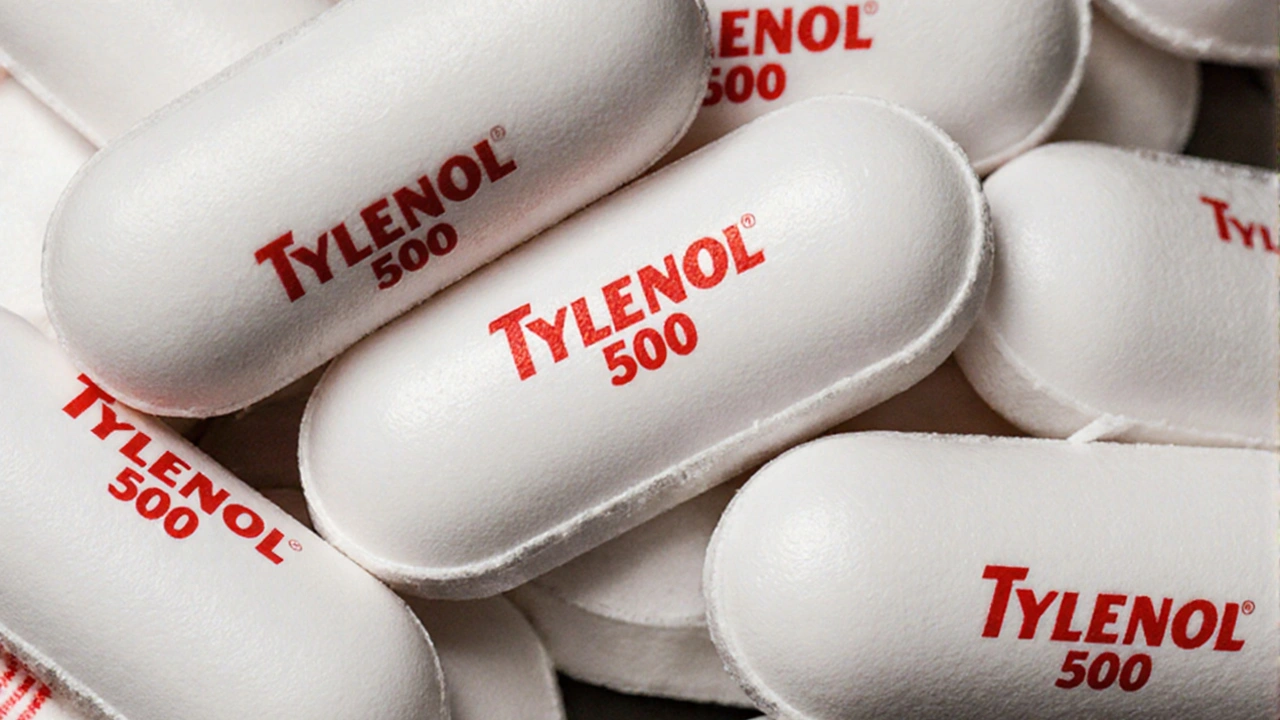
What the new review uncovered
Scientists from Harvard T.H. Chan School of Public Health, the Icahn School of Medicine at Mount Sinai and several international partners have pooled data from 46 separate investigations that looked at a mother’s use of acetaminophen while pregnant. The combined sample exceeds 100,000 children, making it one of the largest examinations of this topic to date.
Using the Navigation Guide Systematic Review method—a protocol designed to weigh environmental health evidence with a transparent bias‑assessment step—the team judged each study for things like selective reporting, missing data and overall methodological rigor. When the numbers were crunched, a consistent pattern emerged: children whose mothers reported taking acetaminophen at any point during pregnancy were more likely to be diagnosed later with neurodevelopmental disorders such as autism spectrum disorder (ASD) and attention‑deficit/hyperactivity disorder (ADHD).
It’s not that the drug suddenly becomes deadly; rather, the analysis suggests a modest but statistically significant increase in risk. The authors stress that the association does not prove causation, but the weight of evidence is strong enough to warrant a re‑evaluation of the long‑standing belief that acetaminophen is the safest over‑the‑counter option for expectant mothers.

What this means for pregnant women
Fever and severe pain during pregnancy are themselves risk factors for adverse outcomes, including neural‑tube defects and preterm birth. Because of that, doctors have traditionally turned to acetaminophen as the go‑to remedy. The new findings don’t call for a blanket ban; instead, they recommend a more measured approach: use the smallest dose that relieves symptoms, keep the treatment window as short as possible, and always do so under the guidance of a healthcare professional.
In practice, this could look like the following: if a pregnant woman experiences a mild headache, she might first try hydration, rest, or a cool compress before reaching for medication. If fever spikes above 38°C (100.4°F), a physician may prescribe a short course of acetaminophen while monitoring the situation closely.
Public health officials are also urged to spread clear messaging about these nuances. Many expectant mothers assume that because a drug is sold without a prescription, it carries no risk. The review challenges that assumption and highlights the need for informed decision‑making.
Future research will likely focus on pinpointing the biological mechanisms that could link acetaminophen exposure to brain development—potentially involving oxidative stress, disruption of hormone pathways, or changes in the fetal blood‑brain barrier. Until those pathways are fully understood, the precautionary principle suggests that clinicians and patients weigh the immediate benefits of fever reduction against the possible long‑term neurodevelopmental implications.
Overall, the study adds a new layer to the conversation about medication safety in pregnancy. It underscores that even widely used, over‑the‑counter drugs deserve rigorous scrutiny when it comes to the next generation’s health.
- tags : acetaminophen pregnancy autism ADHD
7 Comments
Sara Lohmaier September 27, 2025 AT 16:11
The longitudinal epidemiological correlation observed in this meta-analysis, while statistically significant, must be contextualized within the broader framework of developmental neurotoxicology. The relative risk elevation, albeit non-trivial, remains within the bounds of what is typically considered low-effect-size exposure. It is imperative to distinguish between association and causation, particularly when confounding variables such as maternal inflammation, genetic predisposition, and concurrent polypharmacy are not fully controlled.
Moreover, the Navigation Guide Systematic Review methodology, while robust, relies on self-reported data from heterogeneous cohorts, introducing potential recall bias. The absence of biomarker validation-such as cord blood acetaminophen metabolite levels-limits the precision of exposure quantification.
Public health messaging must therefore avoid alarmism. The therapeutic utility of acetaminophen in mitigating fever-induced fetal hypoxia and inflammatory cascades remains clinically indispensable. Risk mitigation should be framed not as avoidance, but as precision dosing: minimal effective dose, shortest duration, and clinician-supervised titration.
To dismiss this class of analgesics outright would be to replace evidence-based caution with ideological dogma-a regression we cannot afford in maternal care.
Sara Lohmaier September 27, 2025 AT 16:52
This study represents a paradigm shift in perinatal pharmacovigilance-particularly in how we operationalize the precautionary principle in low-risk, high-utilization contexts. The dose-response gradient observed across 46 cohorts, even after adjusting for confounders like maternal BMI, smoking, and socioeconomic status, suggests a plausible biological signal.
Emerging mechanistic hypotheses point to acetaminophen’s inhibition of fetal COX-2 pathways, leading to downstream disruption of endocannabinoid signaling and synaptic pruning during critical neurodevelopmental windows. Additionally, the compound’s metabolite, NAPQI, may induce oxidative stress in the fetal brain, where glutathione reserves are still maturing.
What’s compelling is the consistency across geographies: findings replicated in cohorts from Europe, North America, and Asia. This cross-cultural convergence strengthens generalizability. The takeaway? Not ‘avoid at all costs,’ but ‘use with intentionality.’ We’re not talking about an emergency fever regimen here-we’re talking about weekly NSAID alternatives for chronic headaches. That’s where the real risk resides.
Future clinical guidelines should integrate pharmacogenomic screening for GST polymorphisms, which modulate detoxification capacity. Precision prenatal care is no longer aspirational-it’s imminent.
Sara Lohmaier September 28, 2025 AT 16:53
I get that this is concerning, but I also remember how scared I was during my pregnancy just trying to take a Tylenol for a headache. I didn’t want to risk anything, but I also didn’t want to suffer. I think the real issue isn’t the drug-it’s the lack of clear, calm guidance. Doctors used to say ‘it’s fine,’ and now they’re saying ‘maybe not.’ That flip-flop leaves people feeling guilty for doing what they thought was safe.
Maybe we need a middle ground: like a little card you get at your OB appointment that says ‘Use only if needed, max 2 days in a row, never more than 650mg at a time.’ Simple. No scare tactics. Just facts.
Also, I’m not sure if it’s just me, but I feel like every time we find a new risk with something pregnant women use, we act like it’s a trap. What about all the other things we don’t talk about? Like stress? Or sleep deprivation? Those probably matter more.
Just… be kind to ourselves, okay?
Sara Lohmaier September 29, 2025 AT 08:22
Imagine a world where every molecule we ingest becomes a silent architect of the next generation’s mind. Acetaminophen-once hailed as the gentle guardian of maternal comfort-is now, in the quiet corridors of neurodevelopment, a subtle sculptor of synaptic pathways. It doesn’t roar; it whispers. And in that whisper, perhaps, lies the echo of a thousand unborn minds reshaped not by malice, but by ignorance.
Yet here we are, caught between two sacred truths: the sanctity of relief, and the sanctity of the developing soul. To deny a mother pain is to deny her humanity. To ignore a potential shadow on her child’s future is to betray our stewardship.
Perhaps the answer isn’t in banning, but in blessing-with awareness. A single tablet, chosen with reverence, not routine. A moment of pause before reaching for the bottle. Let us not demonize the medicine, but elevate the mindfulness.
Let every pill be a prayer. Let every dose, a decision made in the stillness between breaths.
And if we do this-truly do this-then even the quietest molecules may dance in harmony with the soul they help carry.
Science doesn’t just measure risk. It asks us to measure love.
And love, my friends, is never reckless.
Sara Lohmaier October 1, 2025 AT 06:32
So now Tylenol gives kids autism? Next they’ll say breathing air causes ADHD.
Sara Lohmaier October 2, 2025 AT 16:13
LMAO at people acting like this is news 🤦♀️ I took 3 Tylenol a week for 9 months and my kid is a genius who speaks 3 languages and hates broccoli. 🤷♀️ Also, I think the real risk is doctors not telling us what else to take instead. Like... do I just scream into a pillow now? 😅
Sara Lohmaier October 2, 2025 AT 19:19
I read this study and immediately thought: how many of these women were also exposed to glyphosate, phthalates, or EMF from cell phones? The study never mentions it. And yet, acetaminophen is the villain? That’s convenient.
I know someone who took it every day during pregnancy and her child is perfectly healthy. But another woman, who took it once for a headache, had a child with ASD. Coincidence? Or is someone cherry-picking data to push an agenda?
And why is no one asking who funded these 46 studies? Big Pharma wants us to fear OTC meds so they can sell us expensive ‘safe’ alternatives. I’m not saying this is false-but I’m not buying the narrative either.
My mom took Tylenol during her pregnancies in the 80s. I’m here. My sister is here. Neither of us has autism. So what changed? The diagnosis criteria? Or the fear?
Don’t scare pregnant women. Empower them with real data. Not headlines.
And if you’re going to blame a drug, at least look at the whole picture.
…I’m not saying don’t be careful. I’m saying don’t be manipulated.
Trust your gut. Not the algorithm.